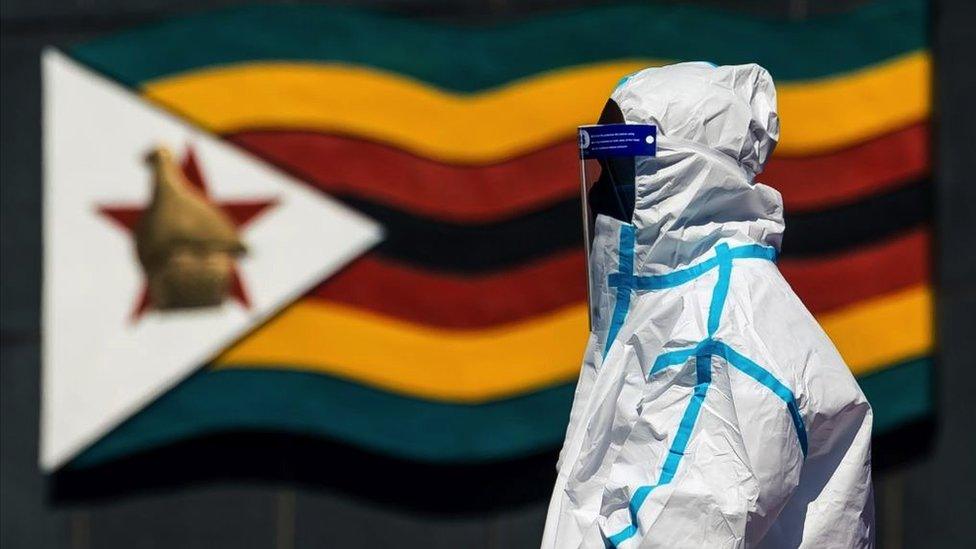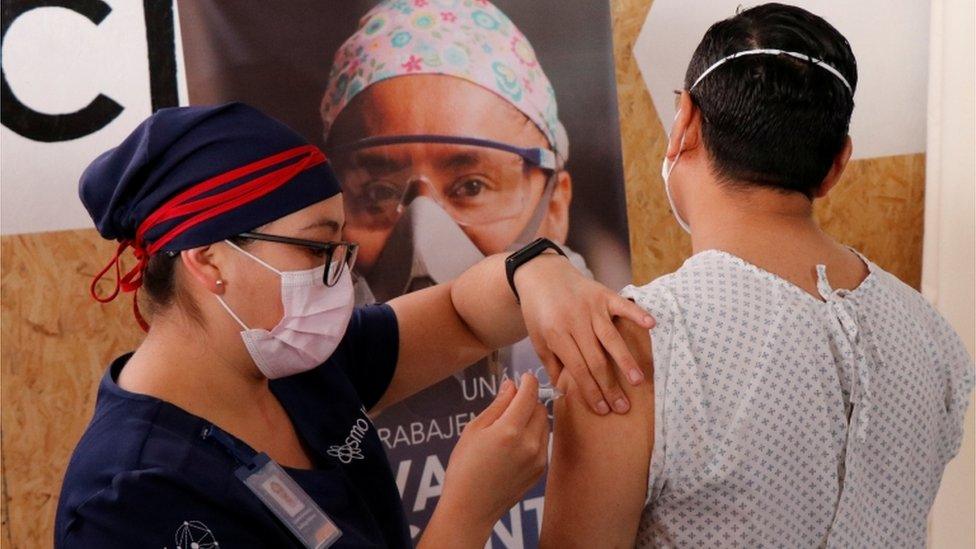Covid: The countries worried they won't get the vaccine
- Published

Some countries are already vaccinating people - but it's not clear when Zimbabwe will get a vaccine
Pictures of the first people being vaccinated against Covid-19 haven't filled everyone around the world with joy. In some places - in countries such as Zimbabwe, Mexico and Pakistan - the battle to get hold of the vaccine is likely to be long and tortuous.
Watching the vaccine roll out in the UK, Lois Chingandu wasn't excited - she was worried. Like most of us, she's looking forward to getting vaccinated and getting life back to normal. But unlike many people right now, she doesn't see light at the end of the tunnel.
It's not clear when her country, Zimbabwe, will get a vaccine. "It's now just an issue of sitting and hoping if we will get it in my lifetime," she says. "I live in fear that I will contract Covid and die because of where I am sitting." It may sound like an exaggeration, but she has seen something very similar happen before.
Ms Chingandu works in HIV prevention and in the late 1990s in Harare, Zimbabwe's capital city, she watched thousands of people die from AIDS each day. Medicine was available to stop it - but only to those who could afford it. "Eventually when the privileged decide that it's time to save the poor people, then we will get the vaccine," she says.
Ms Chingandu is a member of a campaign called the People's Vaccine Alliance, which has admonished rich countries - particularly the US, UK, EU countries and Canada - for hoarding vaccines.
According to researchers at Duke University, which is keeping track of deals between governments and vaccine companies, a handful of countries have secured more supply than their populations actually need. Canada has secured enough vaccines to vaccinate its entire population five times.
These countries took a risk in buying vaccines before they proved to be effective and in turn helped to finance their development. Ms Chingandu and the People's Vaccine campaign believe this process is unfair. They say excess vaccines should be redistributed to countries that need them.
I have seen countries in the Latin-American region that don't have enough money to buy vaccines right now.
So far, 189 countries have signed up to the Covax initiative, which is supported by the World Health Organisation (WHO) and a group of international vaccine advocacy groups. Its aim is to unite countries into one bloc so they have more power to negotiate with drug companies.
Of those countries, 92 - all low or middle-income countries - they will have their vaccines paid for by a fund sponsored by donors. The UK has donated half a billion dollars to this fund. The US and Russia are among the few countries that are not contributing. The remaining countries will buy vaccines through Covax but they may get better deals than if they had negotiated on their own.
So far, Covax has secured deals for three promising Covid-19 vaccines. But, for now, the scheme will only cover the doses needed to cover 20% of a country's population.
Critical months
Mexico is a big supporter of the scheme and is one of the countries that will buy vaccines through it. But the country's chief vaccine negotiator, Martha Delgado, knows 20% won't be enough to stop Mexico's soaring rates of Covid-19. She's working hard to also secure vaccines by other means. Any delay is the difference between life and death. "These months are crucial," she says.
On the 13 October, in what she describes as an iconic moment, her team secured deals directly with three vaccine companies. The team managed to secure a small number of doses of the much-coveted Pfizer vaccine - the first to be administered outside of trials. On Friday, Mexico's regulator approved the vaccine for emergency use and it will roll out this month.
"At least in Mexico we have the money to buy vaccines," Ms Delgado says. "I have seen other countries in the Latin-American region that don't have enough money to buy vaccines right now and they are not really guaranteed access." For many countries Covax is the only current solution.
Everybody is going for a finite pie. The pie is fixed for now and everybody wants a slice of it.
The vaccine that is in development by Oxford University and the drug company AstraZeneca has said it will not profit from sales to developing countries. It's an important part of the Covax portfolio, but it hasn't been authorised for use in any country yet. And one vaccine company will not be able to produce enough doses get vaccines to 7.8 billion people in a matter of months.
Like Mexico, Pakistan has been in talks with every vaccine manufacturer. "We definitely are competing with richer countries. And that was a given," says Faisal Sultan, the special assistant to Pakistan's prime minister on health, who has been central to those negotiations.
"Everybody is going for a finite pie. The pie is fixed for now and everybody wants a slice of it. And there's obviously going to be some jostling and pushing."
So far, he says negotiations are going well but they have yet to secure any doses. Pakistan can't afford to pay for a vaccine before they know that it will work. "That's a luxury," says Dr Sultan. "I think there's only a handful of countries who may do this. If we can get the right stuff, the right combination, we should be okay. But we cannot do blind bets."

A volunteer in Mexico receives an injection as part of trials for the Chinese pharmaceutical company CanSinoBIO
Leading universities in Pakistan have helped to run clinical trials on behalf of Chinese firm, CanSinoBIO and that may help secure a supply but it's not a quid quo pro. And negotiations are not purely about money either. Ms Delgado admits that Mexico's good diplomatic relations were an important part in her successful deals.
"Companies do exist within countries," Dr Sultan agrees. "And when you're talking countries, obviously politics and alliances and all these things do come into play. But at present, what we are trying to do is work above any geopolitical fray, it may or may not be truly possible."
Lois Chingandu and the People's Vaccine are calling for something more radical than diplomacy or even Covax. They want vaccine companies to share the intellectual property, so that generic forms of the vaccine can be made.
The WTO has delayed its decision on whether it will waive intellectual property rules for Covid vaccines. The proposal has won support from some countries at the WTO but is opposed by many Western countries. So for most countries, getting a Covid vaccine is still a waiting game.
"People are going to continue to die of Covid," says Ms Chingandu, "while people in other countries are living a normal life."